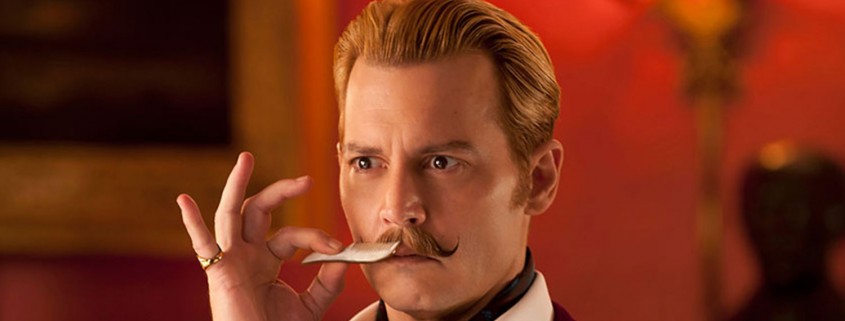Repetitive Johnny Depp needs a career intervention
When the going gets weird, the weird turns prosaic.
There was a time when Johnny Depp was considered the embodiment of offbeat cool, a chameleonic trickster god with the ability to inhabit the weary bodies and restless souls of a seemingly endless caravan of lonely outcasts and loveable eccentrics.
From the wistful whimsy of Edward Scissorhands to the drug-fueled dementia of Fear and Loathing in Las Vegas to the riveting realism of Donnie Brasco, the movies Depp starred in were never box office behemoths; they were intensely personal works of unencumbered outsider art. Then, sometime after the gargantuan success of Alice in Wonderland in 2010, the most versatile leading man of his generation got lost in the costume department, and things took a turn for the corny.
Many pop culture commentators will tell you the actor’s fall from grace actually started well before his trip down the rabbit hole. It has become fashionable to blame Gore Verbinski’s bloated but undeniably entertaining Pirates of the Caribbean trilogy for instigating Depp’s metamorphosis from serious actor to blockbuster gun-for-hire, but that accusation is wide of the mark.
Depp continued turning in compelling, identifiably human performances in films such as Finding Neverland, The Libertine and Sweeney Todd: The Demon Barber of Fleet Street throughout the Disney franchise’s initial run, earning three Oscar nominations in the process (including one for The Curse of the Black Pearl). He might have picked up some bad habits on the Pirates set — mugging for the camera, using makeup and prosthetics as security blankets — but he still appeared fully invested in every role.
Besides, Depp’s rum-guzzling, vaguely fey Captain Jack Sparrow is one of the most iconic cinematic creations of our young century, one who has earned his place in the same action hero pantheon as Indiana Jones and James Bond, characters whose appeal transcends sequel fatigue.
It was the abortive follow-up creations — the break-dancing Mad Hatter in Alice in Wonderland, the kooky blueblood vampire Barnabas in Dark Shadows, the monosyllabic, birdseed-munching Tonto in The Lone Ranger — that truly smacked of boredom and even flagrant self-parody. These sad creatures, each containing some of Captain Jack’s DNA but none of his salty dog soul, are eerily reminiscent of the failed Ellen Ripley clones in Alien: Resurrection — unfinished grotesqueries, never meant to see the light of day.
Recent years have seen the actor hit a series of new professional lows. He sleepwalked his way past Angelina Jolie in The Tourist, an utterly charmless romantic comedy that found him unable to recite even the simplest dialogue without the aid of an e-cigarette as an omnipresent prop. He saw his star power fade to critical levels in last spring’s sci-fi clunker Transcendence. He singlehandedly derailed Kevin Smith’s body horror comedy Tusk the moment he showed up as an obnoxious, Clouseau-esque Canadian detective. He even appeared (uncredited, to his infinite credit) in Adam Sandler’s comedy death march Jack and Jill, no doubt to share in the misery of his Donnie Brasco co-star Al Pacino. Only Rango, The Rum Diary and a surprise cameo in the first 21 Jump Street movie provided occasional glimmers of the man who once played Z movie maven Ed Wood with such manic joie de vivre.
This brings us to Depp’s latest effort, director David Koepp’s capering crime comedy Mortdecai, which is being released in the doldrums of January (usually a bad sign) and was not screened in advance for critics (usually an even worse sign). The film, based on a series of picaresque comic thrillers written by English author Kyril Bonfiglioli, features Depp as the eponymous Mortdecai, an unscrupulous art dealer and bon vivant who prizes his own carefully maintained curlicue mustache above any rare painting or sculpture on earth.
The plot kicks in when Mortdecai’s old friend Inspector Martland (Ewan McGregor) offers the dissolute aristocrat financial compensation for his assistance in recovering a stolen painting that might contain the code to a bank vault filled with Nazi gold. Despite an intriguingly old school premise and the presence of Jeff Goldblum, Gwyneth Paltrow and Paul Bettany, the movie, which cost $60 million, is not expected to do well in theaters, with analysts estimating a weekend gross of less than $9 million.
So what can Depp do to regain his credibility, both as an actor and a reliable box office draw? The latter is simple enough: new installments of Pirates and Alice in Wonderland are already in development, and both are bound to rake in millions due to brand recognition alone. The former is a slightly trickier proposition. One way would be to ditch the wigs, the contact lenses and the funky headgear and start playing real human beings again. The good news? He’s already booked a project that fits the bill rather nicely.
Scott Cooper’s upcoming crime drama Black Mass will feature Depp as Whitey Bulger, the real-life Boston gangster who became an FBI informant in a desperate bid to wipe out his competition. The film, which boasts a powerhouse cast including Benedict Cumberbatch, Sienna Miller and Kevin Bacon, is expected to hit theaters this September. Bulger, the real-life inspiration for Jack Nicholson’s vicious crime lord in The Departed, is the exact kind of role Depp should be pursuing right now, a part that could potentially allow him to break free of the costume department and reclaim his title as one of the leading actors of his generation.
Landon McDonald is a graduate student studying public relations. His column, “Screen Break,” runs Fridays.

